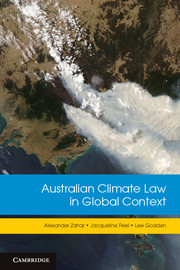Book contents
- Frontmatter
- Contents
- Acknowledgments
- Abbreviations and definitions
- Figures, tables and boxes
- Table of cases
- Table of statutes
- Table of treaties and other international instruments
- Introduction
- 1 Climate law
- 2 Legal elements and ongoing development of the international climate change regime
- 3 Measurement and verification of state emissions and legacy of the Kyoto Protocol’s compliance system
- 4 Development of climate law in Australia
- 5 Putting a price on carbon
- 6 The regulatory network of the Clean Development Mechanism
- 7 The emerging scheme for the protection of forests in developing countries (REDD)
- 8 Climate finance, technology transfer and capacity-building for sustainable development
- 9 Legal and regulatory frameworks for transition to a low-carbon economy
- 10 Biosequestration and emission reduction regulation in the Australian land sector
- 11 Adaptation to climate change through legal frameworks
- Postscript
- Bibliography
- Index
- References
9 - Legal and regulatory frameworks for transition to a low-carbon economy
Published online by Cambridge University Press: 05 December 2012
- Frontmatter
- Contents
- Acknowledgments
- Abbreviations and definitions
- Figures, tables and boxes
- Table of cases
- Table of statutes
- Table of treaties and other international instruments
- Introduction
- 1 Climate law
- 2 Legal elements and ongoing development of the international climate change regime
- 3 Measurement and verification of state emissions and legacy of the Kyoto Protocol’s compliance system
- 4 Development of climate law in Australia
- 5 Putting a price on carbon
- 6 The regulatory network of the Clean Development Mechanism
- 7 The emerging scheme for the protection of forests in developing countries (REDD)
- 8 Climate finance, technology transfer and capacity-building for sustainable development
- 9 Legal and regulatory frameworks for transition to a low-carbon economy
- 10 Biosequestration and emission reduction regulation in the Australian land sector
- 11 Adaptation to climate change through legal frameworks
- Postscript
- Bibliography
- Index
- References
Summary
Introduction
In the previous chapter we discussed the importance of capacity-building in developing countries and the establishment of a system for international transfer of technology as components of the international climate change regime. Arrangements for flows of funding, knowledge and technology from developed to developing countries are a manifestation of equity considerations in international climate law, as well as a practical response designed to reduce greenhouse gas emissions in some of the fastest-growing economies. Such technology flows will also assist in preparing vulnerable countries to adapt more successfully to the effects of climate change. Nonetheless, these efforts raise a fundamental preliminary question: namely, are there technologies available that are adequate to achieve international goals of climate change mitigation and adaptation? An associated question is whether legal frameworks exist to deploy such technologies successfully. These questions animate the discussion in this chapter and the following two chapters, which deal respectively with biosequestration and adaptation.
In this chapter we examine technologies for climate change mitigation, encompassing energy efficiency improvements, renewable energy, nuclear power, and processes for carbon capture and storage (CCS), all of which primarily target emissions in the energy/power generation sector. Attention is also given to technological improvements that reduce emissions in sectors such as building and construction, and transport, given the significant contribution to overall GHG emissions that they represent in many developed countries, including Australia. This discussion is framed by a review of the relevant scientific and policy literature regarding the technological options for climate change mitigation in the energy sector and related spheres. The chapter considers whether such technologies are adequate to the task of putting the world generally, and Australia in particular, on a pathway that will stabilise emissions, avoid global warming and enable a transition to a low-carbon economy. The emerging consensus seems to be that, at least from a technical perspective, climate change mitigation is feasible using existing technologies, although such measures would need to work in concert with demand management/energy efficiency options. However, a potentially more difficult hurdle is the adequacy of legal and regulatory frameworks for enabling rapid deployment of these technologies, and impediments within those frameworks.
- Type
- Chapter
- Information
- Australian Climate Law in Global Context , pp. 293 - 338Publisher: Cambridge University PressPrint publication year: 2012



